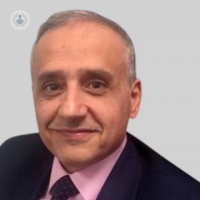Understanding heart health: The role of ECGs
Written by:In the realm of cardiovascular health, Electrocardiograms (ECGs) serve as invaluable tool in the assessment of your heart health. The 12-lead resting ECG, a painless procedure, intricately maps the heart's rhythm from 12 different electrical angles or “vectors”, offering a snapshot of its current condition.
In his latest online article, Dr Mohamed Al-Obaidi describes some nuances of this quick procedure and explores other cardiac monitoring techniques that provide a comprehensive understanding of heart health.

The 12-lead resting ECG:
Performed in a relaxed, slightly inclined position on a comfortable couch, the 12-lead resting ECG involves the strategic placement of ten adhesive patches across the chest, each arm, and each leg. These patches, connected to an ECG recorder, swiftly generate a printout, offering a real-time depiction of the heart's electrical activity. Despite its simplicity, the test remains an invaluable tool in providing baseline information on the heart condition, immediately flagging potential disorders. Furthermore, repeated ECGs over time can unveil evolving issues, presenting a dynamic tool for continuous health assessment.
Ambulatory ECG monitor:
Ambulatory ECG monitor, also known as a Holter monitor or tape, is a method to monitor for any disturbances in heart rhythm. Unlike the instantaneous nature of the 12-lead ECG, this small, portable recorder documents the heart's rhythm over an extended period—typically a minimum of 24 hours and occasionally up to 7 days—while individuals engage in their regular activities. Attached to three, four, or five electrodes strategically placed around the heart, the monitor captures a more comprehensive picture of the heart's behaviour. Upon return, the recorded data undergoes analysis, spotlighting any rhythm disturbances that could elucidate the symptoms experienced by the individual.
Loop Recorders
If longer periods of monitoring of the heart rhythm is required, this can be achieved through implantation of a small recording device (loop recorder) under the skin, this is usually a minor procedure and is performed under local anaesthesia. The loop recorder can record and transmit heart rhythm disturbances to a central monitoring station or by regular downloads from the device. A loop recorder is indicated when there is high suspicion of heart rhythm disturbances that are not captured by a regular holter monitor.
In the quest for optimal heart health, the combination of different cardiac monitoring techniques offers a holistic approach. From the swift revelations of the 12-lead resting ECG to the comprehensive insights of ambulatory ECG monitors and loop recorders, these procedures empower healthcare professionals to unravel the complexities of the heart. By seamlessly integrating technology and medical expertise, these diagnostic tools pave the way for timely interventions, ensuring that our hearts continue to beat strong and steady.
Dr Mohamed Al-Obaidi is a distinguished cardiologist. You can schedule an appointment with Dr Al-Obaidi on his Top Doctors profile.


